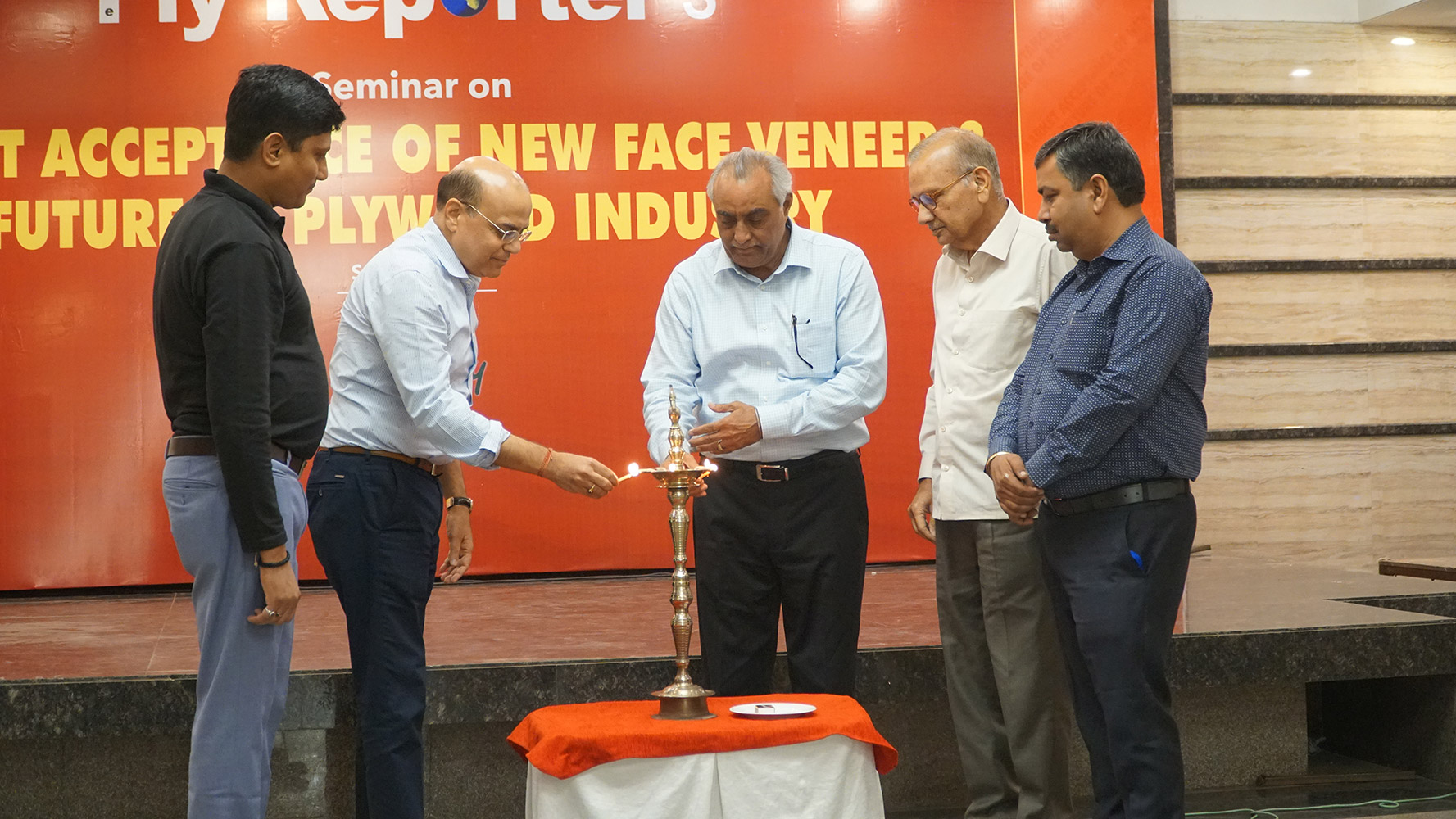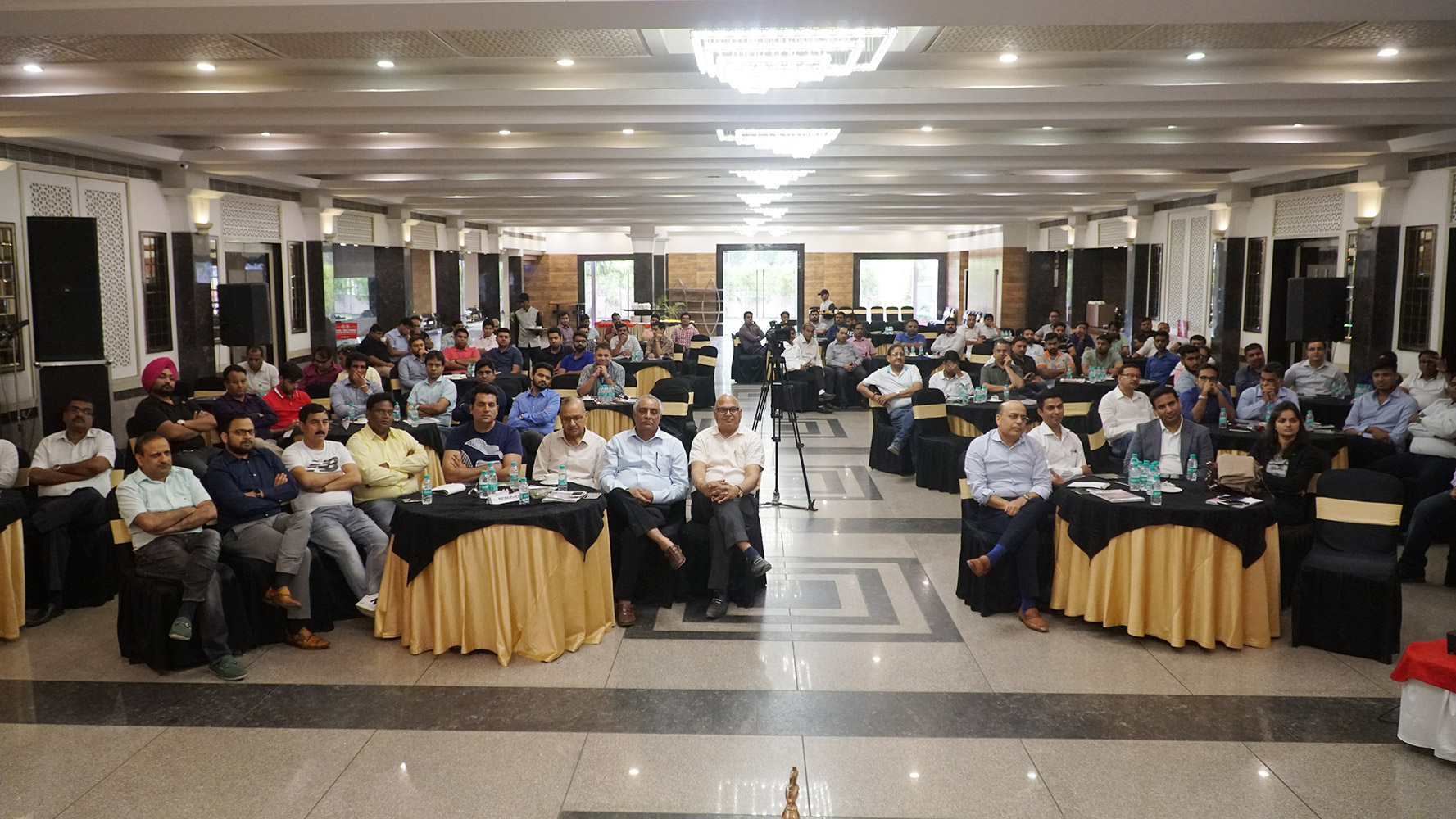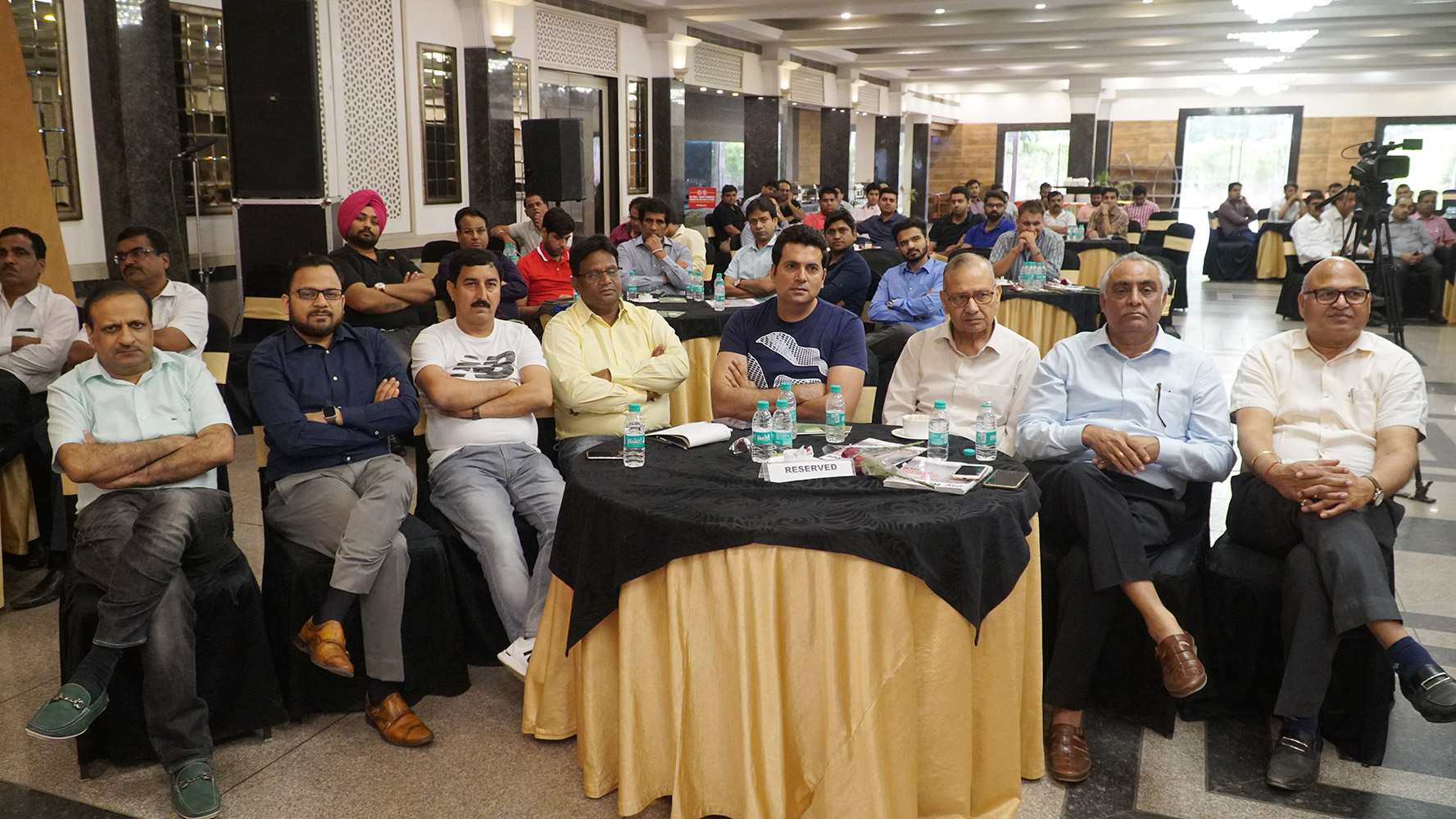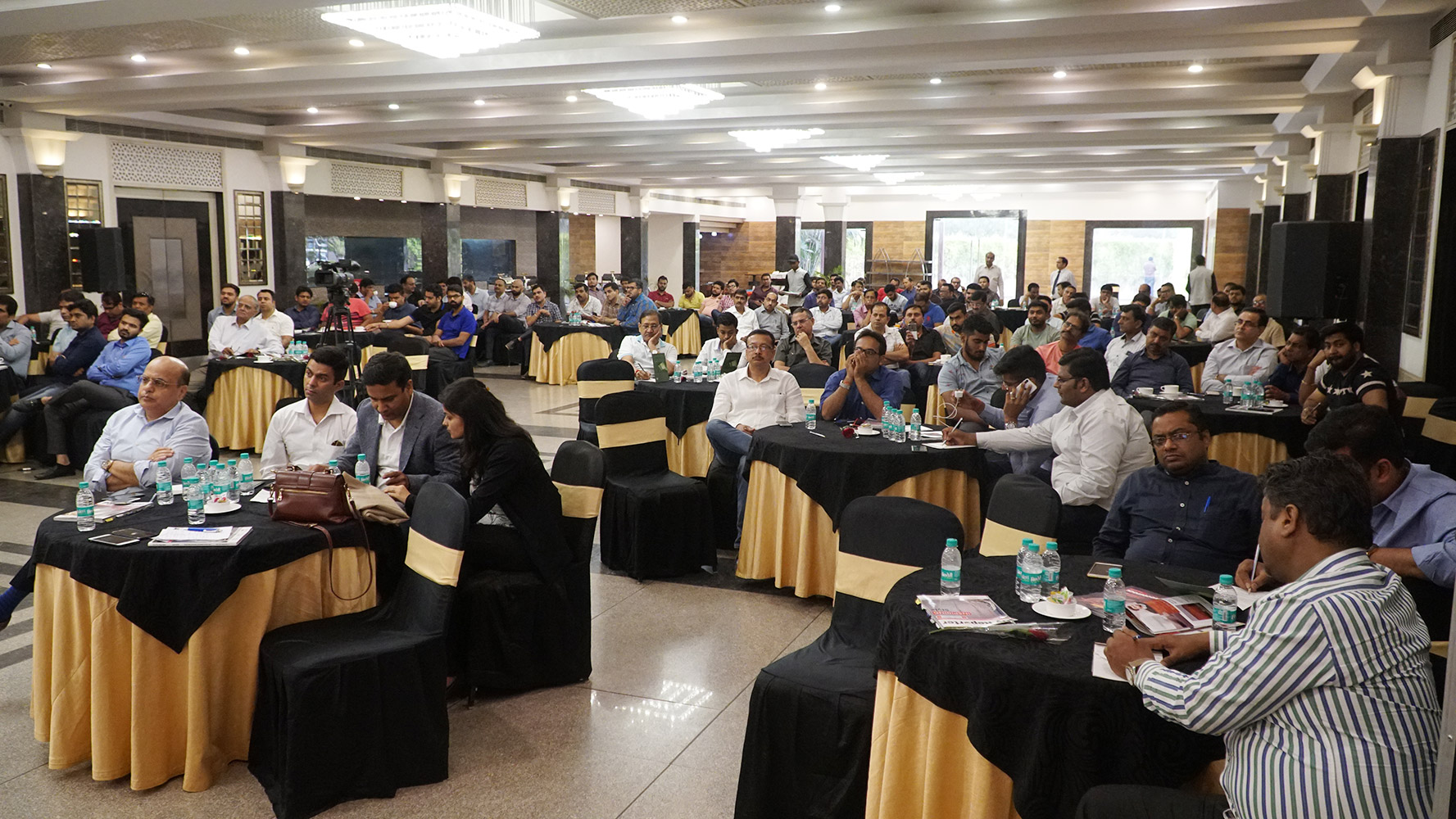
If you have missed your presence in Delhi The Talk of Town by Surfaces Reporter and The Ply Reporter, please send your Request to madhu@surfaces.in so that you Do Not miss next time. We will ensure you get information prior to our next event. Do mention your professional category - Architect/ Engineer/ Urban Planner/ Interior Designer/ Artist/ Brand/ others
Ply Reporter organized seminars on "MARKETACCEPTANCE OF NEW FACE VENEER & FUTURE OF PLYWOOD INDUSTRY on April 21 2018 at Yamunanagar that was supported by Greenply Industries Ltd. The seminar witnessed full house packed session of 3 hours which was attended by around 200 plus Plywood, Board and door manufacturers and Industry professionals.

Mr Rajesh Mittal, Managing Director, Green ply Industries Ltd was key note speaker for the session who addressed the audience speaking about the need of change in present practices and efficiency . He stressed upon growing need of sustainable specie of face veneer which at present is none other than Okoume because of its abundance availability at much lower price than Gurjan.
The meeting at Yamunanagar was inaugurated with lamp lighting ceremony by Mr Rajesh Mittal , Managing Director , GreenPly Industries Ltd; Mr Devendra Chawla, President (AIPMA) Prof. S.K. Agarwal, Chairman of Globe Panel Industries, Mr Ajay Maniktala,( ex President HPMA) and Mr Pragat Dvivedi.
Mr Pragat Dvivedi (founder editor, The Ply Reporter) briefed about the objective of the seminaron Face Veneer and said, ‘After GST, face veneer is another turning point for the plywood Industry’. He added that there is no point using a face veneer of Gurjan which is triple the cost of present available specie Okoume specially when it actually add no strength to plywood. Just for the market pressure which is illogical, The Ply Reporter’s initiatives aimed to support the industry and trade to spread awareness on savings and to make people aware about technical points for adopting Okoume face in factories.

The Ply reporter published its first special issue proposing Okoume as a promising specie way back in 2005 but people did not acknowledge. Today we all know that Okoume can be a sustainable substitute for face veneer if one and all accept it altogether and overcome our confusions and technical hurdles in manufacturing plywood.
Addressing the audience Mr Devender Chawla, President AIPMA briefed about the possibilities of face veneer and said, “Okoume is already in use at some of units at Yamunanagar but its acceptability is less. In my opinion when the acceptance arises at Yamunanagar others also follow the trend. If we altogether send a message to accept Okoume then its better and easier”. He expressed that if Green ply uses Okoume face in their premium products range then why not others can do but it is possible with acceptance and adoptability by all together”. He congratulated the Ply Reporter for this initiative to organize seminar on the said subject.

The key Note speaker, Mr Rajesh Mittal, MD, Green ply Industries said, “The demand for plywood will definitely grow in line with infrastructure growth, economical developments, boost in prices for iron & steel etc, but there will be challenges too with increasing competition.” Mr Mittal added, “The vital factor is to control the production cost without compromising quality whether a manufacturer is small or big, organized or unorganized, everyone has to take this as challenge.”
“At Greenply we try to take maximum utilization of raw material. The most important part is face veneer where If we use Gurjan, it costs 12-15 % on finished material hence we have opted for using 100% Okoume face and we are at very comfortable position in the market now,” he revealed.
Mr Rajesh Mittal said further, “If we reduce the cost of face veneer correspondingly we will have better survival strength in market because it is the time of ‘survival of the fittest.” Expressing technical difficulties about Okoume uses Mr Mittal said, “We have been using Okoume for one year and have faced huge challenge from the market, but after technical R&D with dipping and treatment process, we have successfully shifted 100% on Okoume and now it is very easy to maintain single inventory of Okoume.” He said that Okoume is a sustainable source for face veneer at economical price and industry should adopt it without any doubt.
Following the speech session there was a technical presentation by technocrats from Greenply who shared the technical knowledge and formulations to use Okoume face Veneers that will prevent a ply manufacturers from problems like mica delamination or color variation etc. The key points presented by technical experts are as follows.
Á As a timber Okoume has a natural characteristic which is good and available in abundance and a sustainable resource for face veneer. It has several advantages as it does not leave oil mark as Gurjan due to high temperature of Indian weather.
Mr. Girish Sharma from Greenply explained that in case of Okoume face, the Glue viscosity shall be raised to 22 to 24 (by adding CSP or Maida as filler) to reduce the porosity of the grains of veneer. We also need to mix 1% of red oxide in glue and block the penetration of grain with matching the colour. Okoume’s 10% face comes in white colour which is compulsory to buy but does not attain uniform color while dipping. As a solution a precipitate for Dye Pigmentation will have to be used. If pigments are put directly to dipping solution it do not mix, so first prepare in warm water (temperature 15 to 35 degree) and later mix into dipping solution.

In an interactive session with Mr. Rajesh Mittal, Mr.Bimal Chopra, Mr. Sant Kwatra, Mr. Rakesh Khurana and Mr. Jasveer Singh (CEO, GSEZ), during the seminar ‘Okoume availability and industry scenario’ was discussed, which was well moderated by Mr. Pragat Dvivedi. Mr. Jasveer Singh, Chief Executive Officer - Gabon SEZ (West Africa) at Olam International said, “Gabon forest is spread in 227000 sq km area (far more the area of Haryana 44000 sq km), where the system for cutting trees are different from India or Burma. Gabon divides the total forest area into many small blocks and in a year and they are allowed to cut each year only one block and the next year the other block. There are also limitations for cutting trees as if the diameter is less than 60 cm it cannot be cut. In this way Gabon ensure sustainable supply for long which has no limitation.
Gabon has 1 crore 25 lakh hectare forest and if it is divided into 25 blocks then one block comes to 7 lakh 20 thousand hectare. And according to norms only 3 trees can be cut in one hectare land in a year, with that Gabon can cut 34 lakh cubic meters Okoume and 37000 containers veneer can be supplied in one assigned by the authorities. Mr Singh further said that Gabon has no issue like problem of timber availability but the logistics are in development phase due to which the processing is not going on at fast pace.
Expressing his views during panel discussion, Mr Rajesh Mittal, Managing Director, Greenply Industries said, “We have invested in Gabon with long term prospective after observing the availability of timber for long. The advantage of Gabon is that it has FSC certified largest forest area across the world. It is naturally gown and forest is well managed and on continuous basis it achieves re-growth into new forest.
Commenting on Gurjan, Rajesh Mittal said, “We are facing the difficulty of face veneer and its prices are gone from $400 to $1400 today hence making it unviable. I believe Okoume would not face major changes in terms of price for next 10 to 15 years.” Mr Sant Kwatra, Director, Neelgiri Plywood said, “As Gurjan price increases, I see Okoume as the top priority as its quality is acceptable and if we solve the colour issue its acceptability will increase.” Mr Rakesh Khurana, Director, Radha Krishna Plywood said, “Poplar Timber obtained popularity despite being a low grade specie and I observe the same with Okoume.” Mr Bimal Chopra, Director, Metro Plywood said, “Acceptance will increase but we will have to pass on the price differences to dealers. Mr Bimal also told that he has shifted 60% of his operations to Okoume amidst rising raw material prices. “We have scope to reduce the overhead cost by shifting to Okoume,” he hoped.